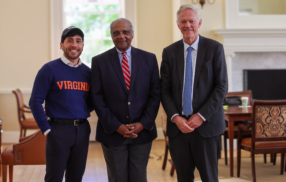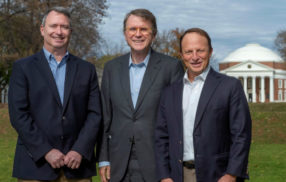UVA Darden’s Bob Bruner Leads Brookings, Miller Center Retrospective on Global Financial Crisis
By Liz Ivaniw Jones
The global financial crisis of 2008 is considered by many economists to have been the worst crisis since the Great Depression of the 1930s. Recent turbulence in the stock market — coupled with a political transition of power in the U.S. House of Representatives — has brought into question our nation’s preparedness for the next crisis, whenever it may occur.
To prompt thoughtful dialogue and offer post-crisis analysis, the University of Virginia Miller Center co-sponsored an event with the Brookings Institution and UVA’s School of Law, Batten School of Leadership and Public Policy and Darden School of Business entitled, Ten Years Later: Lessons from the 2008–09 Financial Crisis.
“Since the nation’s founding, our leaders have looked to history as a guide and, like them, we are gathered to look back at the full dimensions of the 2008–09 crisis,” said Bill Antholis, director and CEO of the Miller Center and nonresident senior fellow of the Brookings Institution. “We are here to ask some truly relevant questions. Are we prepared to handle the inevitable next crisis given the current potent combination of political and economic uncertainty? And as important, do we have the wherewithal to address a similar or worse crisis?”
The Brookings Institution in Washington, D.C., was the venue for the invitation-only event. A cross-section of 400 economists, political scientists, financial practitioners, lawyers and historians assembled to hear blue ribbon presentations and panels designed to assess the actions that worked — and those that did not work — in responding to the economic crisis and its lingering aftermath.
University Professor and Darden School Dean Emeritus Bob Bruner, who studies the causes and complexities of financial crises, underscored the importance of understanding and learning from the lessons of history.
“An aim of today’s conference is to try to connect the dots among crises through time, as well as crises cross-sectionally. What went on in 2008 and in earlier years; not only in the United States, but elsewhere in the world?”
Bruner led a conversation with Lawrence Summers, former director of the National Economic Council during the Obama administration.
“No. And then yes. And then no. Let me tell you what I mean,” Summers said in response to Bruner’s question on whether the government and bank industry response to the financial crisis used enough “shock and awe” to address it. Summers said the initial response by government and the finance industry was far from adequate, as business continued to be conducted as usual despite dire warnings. However, for six months after the collapse of Lehman Brothers, “America rose to the occasion.”
“The banks were substantially recapitalized, significant fiscal stimulus was delivered, substantial interventions to provide liquidity to the financial markets were engineered, and the sharpest ‘V’ in the history of the major economies was recorded. So at the most important and dire juncture, we acted very strongly and decisively, appropriately and effectively.
Explaining the final “no,” Summers concluded, “Driven by misguided concern about budget deficits and a desire to get to long-term agendas, by the end of 2009 people were … declaring that the ‘green shoots’ of recovery were at hand — and the ball was dropped. As a consequence, the expansion was substantially slower than it could have been … [with] less capital investment and more people unemployed for a longer period of time. Victory was declared prematurely.”
Decisions made during the financial crisis have been alternatively applauded and derided, but Bruner said a willingness to take decisive action in-and-of itself was essential to the response. “It’s clear that among all the attributes of leadership, one of them must be fearlessness in confronting major problems,” Bruner said.
Additional highlights of the event were the retrospectives of leading economists Peter Orszag, former director of the Office of Management and Budget, and several panels on topics from post-crisis regulation to legislative politics during the crisis. Bruner also moderated a panel titled Comparative Perspectives featuring a panel of academics with expertise studying the crisis.
There was agreement among presenters that Congress played a pivotal role in remediating the crisis and exceeded expectations by its show of bipartisanship in a time, not unlike the present, of political complexities, divided government and mistrust between the executive and legislative branches. John Lawrence, former chief of staff to then-Speaker of the House Nancy Pelosi, and Daniel Meyer, former assistant and deputy assistant to the President for Legislative Affairs in the George W. Bush administration, recounted the frenetic series of events leading up to passage of the sweeping Emergency Economic Stabilization Act that instituted the controversial $700 billion Troubled Asset Relief Program (TARP), passed to shore up the financial sector.
Only a few pages in length, the remarkably concise bill received Congressional approval with only perfunctory hearings, no expert or public testimony, no extensive legislative mark-up and no amendments. Lawrence observed, “TARP stands as the most extraordinary example of political leadership of that time.”
The magnitude of 2008’s financial crisis sharply focused the nation’s immediate need for direct and expansive action. It powered government intervention, drove Congressional consensus, and provided a guidebook for future national leaders to study in tackling similar challenges on a bipartisan basis.
The day’s lesson underscored the fact that financial crises, if left unchecked, can sharply worsen a recession as happened in 2008, by sending the real economy into a tailspin. As a result of laws and regulations introduced since 2008, the financial system seems better-prepared for future shocks. But given today’s polarized and contentious political climate, the general consensus among presenters was that the ability to mobilize collective action in the face of a future financial crisis will be harder. The response to the crisis of 2008 probably averted another Great Depression, but the conference experts were not satisfied with the policymaking and execution that took place. To do better next time requires faster collaboration among agencies, better alignment within Congress, and strategies that pre-empt (rather than react to) the growing crisis.
The University of Virginia Darden School of Business prepares responsible global leaders through unparalleled transformational learning experiences. Darden’s graduate degree programs (MBA, MSBA and Ph.D.) and Executive Education & Lifelong Learning programs offered by the Darden School Foundation set the stage for a lifetime of career advancement and impact. Darden’s top-ranked faculty, renowned for teaching excellence, inspires and shapes modern business leadership worldwide through research, thought leadership and business publishing. Darden has Grounds in Charlottesville, Virginia, and the Washington, D.C., area and a global community that includes 18,000 alumni in 90 countries. Darden was established in 1955 at the University of Virginia, a top public university founded by Thomas Jefferson in 1819 in Charlottesville, Virginia.
Press Contact
Molly Mitchell
Senior Associate Director, Editorial and Media Relations
Darden School of Business
University of Virginia
MitchellM@darden.virginia.edu







